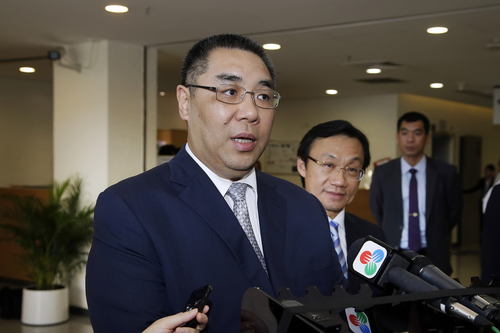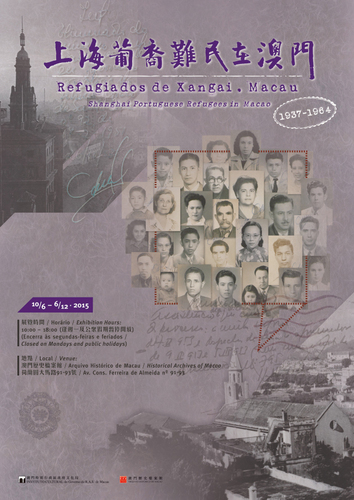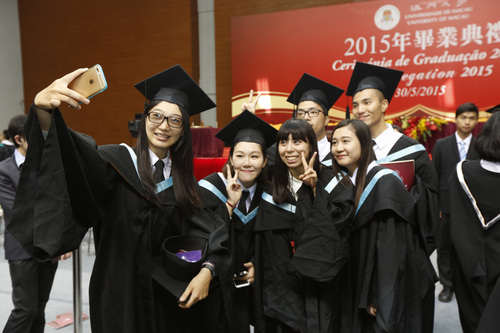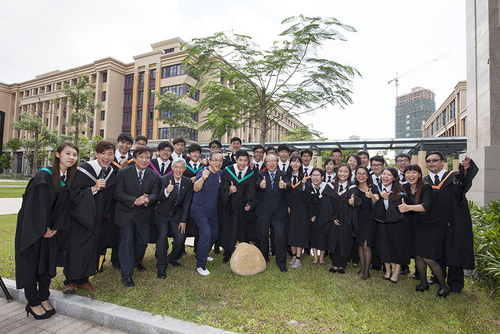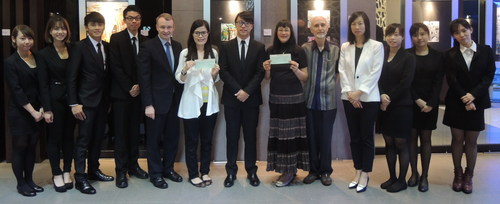Macao SAR Government Portal
News
Government has adequate resources to protect public health
The Chief Executive Mr Chui Sai On has assured the public that the Government has adequate resources and facilities, including clear legislation for the prevention and control of diseases. Mr Chui gave this the assurance on 30 May, following the report that a Korean male who travelled to Guangdong via Hong Kong was infected with the Middle East Respiratory Syndrome (MERS) virus. Mr Chui said effective quarantine and tracing measures were necessary, as symptoms might appear days later. According to the latest information from Hong Kong health authorities, no Macao resident was on the same flight as the man who flew from Seoul to Hong Kong on 26 May. The Health Bureau said they saw no sign of the spreading of the disease by the five of the 29 who had close contact of the man on the plane: the five visited Macao briefly on 27 and 28 May. However, a Korean visitor who was on the same flight and now in Macao is urged to contact the Bureau. The Bureau will keep in touch with the World Health Organization and health authorities in neighbouring areas on the latest situation and health status of the close contacts. In another case, a resident who returned from Korea with fever was tested for MERS, but results showed the virus was H3N2 influenza. The Bureau urged the public, especially those who have visited the Middle East and Korea recently, to immediately seek medical treatment if fever or cough symptoms developed.
…
The Historical Archives of Macao hold the exhibition "Shanghai Portuguese Refugees in Macao (1937-1964)" to celebrate the International Archives Day
In celebration of the International Archives Day, the Historical Archives of Macao (HAM), under the auspices of Cultural Affairs Bureau, present the exhibition “Shanghai Portuguese Refugees in Macao (1937-1964)” and will hold related lectures from 10 June to 6 December 2015. The exhibition will be inaugurated on 9 June at 6:30pm at the Historical Archives of Macao on Tap Seac Square. A series of lectures on the theme is scheduled during the exhibition period. The first lecture will be held on 11 June at the Auditorium of the Cultural Affairs Bureau on Tap Seac Square from 6:30pm to 8:00pm. The mid 19th century saw the beginning of Macanese emigration to different parts of the world, with major destinations being the cities of Hong Kong and Shanghai. Starting from 1937, due to the Japanese invasion of China, World War II, Chinese civil war and other factors, the Macanese were forced to leave Shanghai to seek shelter in Macao. Some of them later settled in Macao for good and others stayed in the enclave for some time before they continued their journey to North America (United States and Canada), Brazil, Portugal, Angola and Mozambique amongst other countries. The HAM hold a few thousand records related to the topic. This exhibition will showcase a selection of over one hundred records that illustrate the historical background of the Macanese Diaspora around the world, the social inclusion of the Macanese in Shanghai, the flight of Portuguese refugees to Macao and the aid they received in Macao. Also on display will be several documents and materials, including the personal items of one of the Shanghai Portuguese refugees, Clementina Fernandes. A series of lectures on the theme is scheduled during the exhibition period. The first one will be given by Mr. Alfredo Gomes Dias, adjunct professor at the Lisbon College of Education, on the characteristics of Macanese emigration and the registration system, relief measures and living conditions of Portuguese refugees in Macao. The lecture will be conducted in Portuguese with simultaneous interpretation to Cantonese and will be held on 11 June at the Auditorium of the Cultural Affairs Bureau on Tap Seac Square from 6:30pm to 8:00pm. Admission is free. The exhibition "Shanghai Portuguese Refugees in Macao (1937-1964)" will be open daily from 10:00am to 6:00pm, except on Mondays and public holidays, at the Historical Archives of Macao located in Tap Seac Square. For enquiries, please visit the MHA official website at www.archives.gov.mo or call through tel. no. 2859 2919 during office hours.
…
IC announces selected applicants for the 2014 Subsidy Programme for the Production of Original Song Albums
The Cultural Affairs Bureau (IC) completed the selection for the 2014 Subsidy Programme for the Production of Original Song Albums and a total of eight entrants were selected as beneficiaries of the Programme. IC will grant each beneficiary a subsidy of up to MOP200,000 for the production, cover design, marketing and promotion of a song album. In order to provide more opportunities for talented local music creators and producers to release their works, increase the number of outstanding works and lay the groundwork for market development, IC launched the abovementioned Subsidy Programme in 2014 for the first time, in which 31 out of 36 applications were deemed valid. After evaluation by the professional adjudicating panel, eight applicants were granted a subsidy as follows (in no particular order): Leong Chi Long, Joe Lei, Wong Hin Cheng, Ung Kuoc Iang, Chong Chon Heng, Manhão Jorge Filomeno Antonio, Chang Heng Ian and Wong Eunice. The adjudicating panel invited by IC, comprised professionals from Hong Kong and Taiwanese music circles, namely renowned Hong Kong music producers Schumann and Yu Yat Yiu; well-known Hong Kong music professional, Dennie Wong; A&R manager of Warner Music Hong Kong Ltd., Robin Chi; Taiwanese music channel Street Voice director, Chen Hung-shu, and Taiwanese Riverside Live House founder, Lin Cheng-ju. The Subsidy Programme for the Production of Original Song Albums was first launched in 2014, and is part of the IC’s Subsidy Programme Series for Macao’s Cultural and Creative Industries. With the launch of a series of targeted subsidy programmes and supportive measures, IC aims to support and cultivate local professionals in the cultural and creative industries, incubate outstanding cultural and creative products, publicise and promote Macao’s cultural and creative brands as well as encourage the growth of cultural and creative industries in Macao. For enquiries about the results of the Programme, please call Mr. Ho or Ms. Lao, staff members of IC, through tel. no. (853) 2892 4040 during office hours.
…
Applications for the Cultural Affairs Bureau 2015 Subsidy Programme for Fashion Design on Sample Making open in the beginning of June
The Cultural Affairs Bureau (IC) is launching the 2015 Subsidy Programme for Fashion Design on Sample Making in the beginning of June. Eligible applicants will be granted subsidies of up to a maximum of MOP160,000 for sample production and promotional materials of selected entries. The maximum quota of the Subsidy Programme is eight persons (groups) and the application period is open from 9 June to 7 August 2015. IC launched the Subsidy Programme for Fashion Design on Sample Making in 2013, as part of the Subsidy Programme for Macao’s Cultural and Creative Industries Series. This programme seeks to encourage local fashion design and creativity, promote fashion designers to draw up feasible and optimised business plans, encourage the industry to be involved in commercial activities or participate in local and international fashion marketing activities, enhance the popularity and market competitiveness of the local industry and carry forward the sustainable development of the local fashion design industry. The Programme has been running for two years and has attracted the participation of numerous fashion designers, playing a proactive role in the local fashion design industry. For these reasons, IC will continue to organise the Subsidy Programme for Fashion on Sample Making this year. Applicants must hold a valid Macao S.A.R. Resident Identity Card and be 18 years old or above. They can apply on an individual or group basis (max. two persons) by submitting entries and application forms with the relevant supporting documents. The selection is divided into two stages: initial review and second review. For the initial review, applicants must submit fashion design drawings of their unpublished, original fashion design entries together with completed application form. The adjudicating panel will select a maximum of 15 entries for the second review based on six criteria: creativity and originality, market potential, quality, overall visual effects, feasibility and degree of perfection of the exhibition plan and business plan, as well as the rationale of planning and budgeting. Applicants selected for the second review will be granted an allowance to produce a fashion sample based on the flat drawings submitted for the initial review, and present it to the adjudicating panel by a model of their choice. Upon completion of the second review, the adjudicating panel will, according to the aforementioned criteria, select a maximum of eight applicants eligible for subsidy up to a maximum of MOP160,000 each, covering the costs for the entire series of the selected entries such as production of samples, promotional materials, and so on. The Programme’s information, application rules and forms can be downloaded from the Cultural Affairs Bureau website (www.icm.gov.mo/dpicc/sps) and from the Macao Cultural and Creative Industries website (www.macaucci.com). Applicants should submit all required documents to: Cultural Affairs Bureau—Department for the Promotion of Cultural and Creative Industries (Av. da Praia Grande, No. 567, Edif. BNU, 12th floor A-D, Macao) during the specified submission period. For enquiries, please contact Ms. Lam or Ms. Lau through tel. no. (853) 2892 4040 during office hours.
…
UM plays a positive role in promoting Macao’s image internationally, says CE at UM’s Congregation 2015
The University of Macau (UM) held the Congregation 2015 in its Sports Complex today (30 May) to present certificates to more than 1,000 graduating students. Chui Sai On, chief executive of the Macao SAR and chancellor of UM, noted at the ceremony that UM’s increasing international influence plays a positive role in promoting Macao’s image internationally, and he believes that UM will continue to occupy an important position on the higher education scene in Macao and make significant contributions to improving the overall quality of higher education in Macao. Chui Sai On officiated at the ceremony in the company of Secretary for Social Affairs and Culture Tam Chon Weng, UM’s University Council Chair Lam Kam Seng, UM Rector Wei Zhao, and Vice Rectors Lionel Ni, Rui Martins, Haydn Chen, and Alex Lai. More than 4,000 people attended the ceremony, including members of UM’s University Assembly, University Council, and Senate; government officials; prominent members of the community; students’ parents; and UM faculty and staff. This year UM set up ramps by the stage to facilitate graduates with disabilities. ‘The University of Macau has made significant headway in every major aspect in recent years,’ said Chui Sai On at the ceremony. ‘The new campus is now up and running, the educational and curriculum reforms are being carried out that witnessed the implementation of the “4-in-1” education model, and a raft of academic and administrative optimising measures have been put in place. Raising its academic status and influence aside, these reforms will enable the university to achieve sustainable development and increase its capabilities to nurture talent. As the university is going from strength to strength, it has taken another big step closer to realising its aspiration to become a world class university. It has also, under this very same manoeuvre, done a very good job in promoting the international image of Macao.’ Chui Sai On added that UM has become an important talent training base in Macao and he believes that UM will continue to occupy an important position on the higher education scene in Macao and make significant contributions to improving the overall quality of higher education in Macao, adding that the SAR government will continue to support UM to help it scale new heights. Rector Wei Zhao congratulated the graduates. He said, ‘Six years ago, the land we are now standing on was a farmland separated from Macao. Today, thanks to the full support of the central and the Macao governments, the land has turned into the campus that inspires and awes everybody and that is seamlessly connected to Macao. What had seemed a mission impossible has become the mission accomplished! And you are those students who have had the opportunity to spend your time across the two campuses and thus were able to witness the historic moment of the transition.’ Rector Zhao said that the university hopes to improve its soft power to keep pace with the first-class facilities, and will push forward reforms in various areas to support the university’s long-term development. He expressed hope that UM will become a more cost-effective university with greater accomplishments. Ao Peng Kong, representative from UM’s Alumni Association, expressed hope that the graduates will follow the university’s motto – Humanity, Integrity, Propriety, Wisdom and Sincerity, and give back to society, take care of their families, and chase their dreams. He added that Macao’s prosperous economy presents an excellent opportunity for the graduates. He advised the graduates to take advantage of the opportunities arising from Macao’s role as an important international trade and tourism centre and a platform for economic and trade cooperation between China and Portuguese-speaking countries, as they begin a new chapter in their lives. Lee Un Man, representative of this year’s graduates and one of the first cohort of graduates from UM’s Institute of Chinese Medical Sciences, thanked all the teachers for their guidance, staff for their dedicated service, and families for their unwavering support. She said she felt lucky that she chose to stay in Macao instead of going abroad for further studies, because otherwise she wouldn’t have had the opportunity to study at UM. ‘Our university is trying hard to innovate and take its place among the best. We as its students and graduates must do the same, and never stop learning,’ she said. This year UM graduated more than 1,400 bachelor’s degree graduates from the Faculty of Arts and Humanities, Faculty of Business Administration, Faculty of Education, Faculty of Law, Faculty of Science and Technology, and Faculty of Social Sciences. Its Institute of Chinese Medical Sciences graduated the first cohort of students. 40 outstanding graduates from different faculties have also completed their programmes at the Honours College.
…
UM graduates plant tree on campus for the first time to show gratitude to alma mater
The University of Macau’s (UM) Class of 2015 graduates today (30 May) planted a flame tree on the Alumni Avenue on the new campus, to express their gratitude to the alma mater. This is the first time UM graduates have planted a tree on the new campus as a present for the alma mater. ‘Today is an important day in UM’s history,’ said UM Rector Wei Zhao at the tree-planting ceremony. ‘It is the first time that our graduates have planted a tree on the campus, and from now on, the flame tree will grow together with UM and our graduates.’ Rector Zhao thanked the Class of 2015 graduates for collectively donating a tree to their alma mater before graduation, saying that it is a precious present from the graduates to UM’s current and future students. ‘Educating people has often been likened to planting trees,’ said Celia Leong, one of this year’s graduates. ‘This is our gesture of expressing our gratitude to our alma mater for helping us grow in so many ways. It is also our little parting gift to future students, because when the tree grows up, it will provide shade for them.’ Iu Ieng Kit, president of the Graduation Committee, said that the graduates chose May, the flowering season of flame trees, to plant a tree for the alma mater, because they hope that all the graduates will remain in touch as they begin a new chapter of their lives after graduation. Guests attending the tree-planting ceremony included Rector Wei Zhao, Vice Rector for Student Affairs Haydn Chen, Registrar Paul Pang, Alumni and Development Office Director Vong Peng Chun, Communications Office Director Katrina Cheong, and acting Dean of Students Chau Kwai Chee.
…
IFT 20th Anniversary Charity Classical Concert
A charity classical music concert was held in the Grand Hall of the Institute for Tourism Studies (IFT) earlier this month. The first part was a series of performances by IFT students and faculty with pieces such as Sonata No. 4 in A flat major from Beethoven played by Christine Zhen, El Tango Para Violin by Orientango played by IFT Invited Assistant Professor Suh-hee Choi, and the IFT Chamber Music Club playing three pieces inspired by the Super Mario Bros video game. The second part featured Ms. Abia Ng, a renowned young pianist and composer who played one of her own compositions and a piece by Turina. The concert was a fund raising event, the profit of MOP 293,105.41 generated was donated to two charities, namely Christians in Action and Orbis Macau. This event was designed, planned and held by Tourism Event Management Year 2 Class A students. It was also one of the celebratory events of IFT 20th anniversary.
…
Package tours and hotel occupancy rate for April 2015
Information from the Statistics and Census Service (DSEC) indicated that visitors on package tours totalled 806,000 in April 2015, down by 6.8% year-on-year. Package tour visitors from Mainland China (648,000) and Taiwan (45,000) dropped by 6.6% and 19.6% year-on-year, while those from the Republic of Korea (35,000) and Hong Kong (29,000) rose by 11.9% and 0.5% respectively. Visitors arriving on package tours decreased by 7.7% year-on-year to 657,000, with those from Mainland China (518,000) and Taiwan (38,000) dropping by 8.4% and 21.2% respectively. Meanwhile, visitors joining local tours totalled 150,000, a decrease of 2.6%. In the first four months of 2015, visitors on package tours reached 3,385,000, up by 6.5% year-on-year; those arriving on package tours grew by 6.1% to 2,751,000. Outbound residents using services of travel agencies totalled 113,000 in April 2015, a year-on-year decrease of 1.8%; those travelling on package tours dropped by 1.1% to 45,000, and the main destinations were Mainland China (77.0% of total), Taiwan (8.8%), the Republic of Korea (4.2%) and Hong Kong (3.5%). In the first four months of 2015, outbound residents using services of travel agencies totalled 497,000, up by 6.2% year-on-year. There were 99 hotels and guesthouses operating at the end of April 2015, providing 28,000 guest rooms, up by 1.7% year-on-year; 5-star hotels accounted for 64.8% of the total supply, with 18,000 rooms. A total of 827,000 guests checked into hotels and guesthouses in April 2015, down by 7.1% year-on-year. Guests from Mainland China (521,000) decreased by 12.0%, while those from Hong Kong (125,000) and Taiwan (29,000) increased by 10.9% and 8.6% respectively. The average length of stay of guests held stable as April 2014, at 1.4 nights. The average occupancy rate of hotels and guesthouses was 79.4%, a rebound from March (77.2%) yet still down by 5.9 percentage points year-on-year; the rate of 4-star hotels and 5-star hotels was 82.2% and 79.5% respectively. In the first four months of 2015, hotel guests totalled 3,184,000, down by 10.4% year-on-year; the average occupancy rate stood at 79.0%, a decrease of 7.3 percentage points. Visitor-guests accounted for 68.1% of the total overnight visitors, down by 1.5 percentage points year-on-year.
…
External merchandise trade statistics for April 2015
Information from the Statistics and Census Service (DSEC) indicated that total merchandise export for April 2015 amounted to MOP953 million, up by 15.2% year-on-year; value of re-exports expanded by 22.3% to MOP824 million, of which re-exports of Clocks & watches soared by 128.7%; however, value of domestic exports dropped by 16.0% to MOP129 million. Total merchandise import declined by 4.3% year-on-year to MOP6.88 billion, of which imports of Gold jewellery and Watches fell by 41.7% and 8.6% respectively. Merchandise trade deficit amounted to MOP5.93 billion. In the first four months of 2015, total value of merchandise export grew by 10.7% year-on-year to MOP3.65 billion, of which value of re-exports (MOP3.02 billion) and domestic exports (MOP629 million) rose by 12.6% and 2.2% respectively. Total value of merchandise import grew by 1.2% to MOP29.10 billion. Merchandise trade deficit widened to MOP25.45 billion for the first four months of 2015. Analysed by destination, merchandise export to Hong Kong (MOP2.30 billion) and Mainland China (MOP522 million) in the first four months of 2015 increased by 12.2% and 25.1% year-on-year, while export to the EU (MOP83 million) and the USA (MOP67 million) decreased by 19.9% and 31.6% respectively. Exports of Non-textiles increased by 11.6% year-on-year to MOP3.40 billion, of which value of Clocks & watches (MOP576 million) and Tobacco (MOP163 million) rose by 54.8% and 55.7% respectively, but that of Machines, apparatus & parts (MOP435 million) dropped by 24.8%. Exports of Textiles & garments totalled MOP254 million, down by 0.5%. By country of origin, merchandise import from Mainland China (MOP10.92 billion) in the first four months of 2015 increased by 18.6% year-on-year, while import from the EU (MOP6.70 billion) fell by 9.5%. Imports of Consumer goods dropped by 8.0% to MOP17.02 billion, with imports of Gold jewellery (MOP2.42 billion) decreasing by 33.2%, but that of Food & beverages (MOP4.08 billion) increasing by 11.6%. Moreover, imports of Mobile phones (MOP3.55 billion) expanded by 56.5%. External merchandise trade reached MOP32.76 billion in the first four months of 2015, up by 2.1% compared with MOP32.07 billion a year earlier.
…
Consumer Council released latest ‘Supermarket price survey’ in Taipa and Coloane area
Consumer Council conducted its eighth ‘Supermarket price survey’ in May on 28 May for the implementation of Section 2b), Article 10, Law 4/95/M of 12 June. Surveyed locations included 12 supermarkets in Taipa and Coloane area. The latest ‘Supermarket Price Survey’ is now available on Consumer Council’s website (www.consumer.gov.mo), ‘Supermarket Price Information Platform’ iPhone and Android apps, and on the Council’s WeChat account page. The survey is also available free of charge at the offices of Consumer Council, IACM’s Iao Hon and S. Domingos Markets, bookstores and libraries. Consumers may also access the resources through WAP channels on their mobile phones. With reference to the local six parishes and the number of supermarkets in each parish, the Council has divided around 100 supermarkets into 8 areas for price collection. The Council collects prices from these supermarkets for the provision of a more comprehensive database for consumers to check price discrepancies and make price comparisons according to their desired locations. For inquiry, please call 8988 9315.
…


